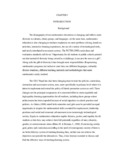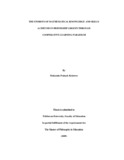Please use this identifier to cite or link to this item:
https://elibrary.tucl.edu.np/handle/123456789/947| Title: | The Upshots of Mathematical Knowledge and Skills Achieved in Friendship Groups through Cooperative Learning Paradigm |
| Authors: | Kshetree, Mukunda Prakash |
| Keywords: | knowledge;Cooperative |
| Issue Date: | 2009 |
| Publisher: | Faculty of Education |
| Institute Name: | Faculty of Education |
| Level: | M.Phil. |
| Abstract: | The cooperative learning paradigm has been figure out as an umbrella method of all other methods. It has itself many methods but each and every one has been found to be dedicated to make the learning creative, joyful, socialized, team working and meaningful based on the potentiality of prior knowledge of the students as their cultural capital. As the method runs through social activity and teamwork, it seeks the true and direct participation of the learners with their own head and soul. It has mainly been spinning on the three theories; psychology of building knowledge through mental exercise/action of Piaget, Lave and Vygotsky’s anthropological perspective of learning through scaffolding and Dewey’s philosophy of truth is subjective. In this closure, the study was undertaken with the purpose of digging out the effectiveness of cooperative learning approach through the ‘friendship group’ formation in terms of immediate learning, withholding and ultimately the net gain in learning. In the mean time, it was tried to find out the problems being faced by the teachers while adopting cooperative learning system, self-regulation of the students and relevancy of this approach in Nepalese classroom situation. To ease my study, I had further formulated the principal research questions into other components as well. The basic framework of the theoretical closure was made to lay on the foundation of epistemology, ontology and axiology of the cooperative learning paradigm. In this study, the review of literature has covered the general overview of different types of related literatures to frame up the study with specific ingredients and some theoretical closures that to link the issues raised herewith. As I was basically concerned with the perception, participation and output of the learning of the students based on their cultural and social property, I adopted the qualitative research method along with the quantitative one. The research method used was non-equivalent control group of quasi-experimental design. The study was done by taking sample of size 74 students comprised of control and experimental groups from two schools of Kathmandu valley. The major tools of qualitative method were observation of classrooms with checklist and interview of students, subject teachers, general teachers, head teachers, subject experts, supervisors and curriculum experts with interview guidelines. Similarly, the pretest, posttest and retention test were administered to collect the data for quantitative analysis. The quantitative data were analyzed with the help of 13.0 version of SPSS package whereas the qualitative data were properly arranged and triangulated with the theoretical closures and previous findings and then gave the final meaning to my findings. The major findings were the significant achievements of the students of experimental group, who were taught according to the cooperative learning phenomena with the help of cooperative teaching incidents through friendship groups. The achievements were taken into account of immediate learning, last longer memory, net gain and three cognitive domains. Similarly, the study has shown the self-esteemness of the students and relevancy of cooperative learning method with some modifications in Nepalese classroom set-ups. In this study, I also realized that the importance of learning environment which includes classroom set up, friendship groups, cultural and social capital, valuing and relating the pre-existed knowledge of students to achieve the mathematical knowledge and skills. |
| URI: | http://elibrary.tucl.edu.np/handle/123456789/947 |
| Appears in Collections: | Mathematics Education |
Files in This Item:
| File | Description | Size | Format | |
|---|---|---|---|---|
| Chapter Page.pdf | 782.67 kB | Adobe PDF |  View/Open | |
| Cover Page.pdf | 41.44 kB | Adobe PDF |  View/Open |
Items in DSpace are protected by copyright, with all rights reserved, unless otherwise indicated.
